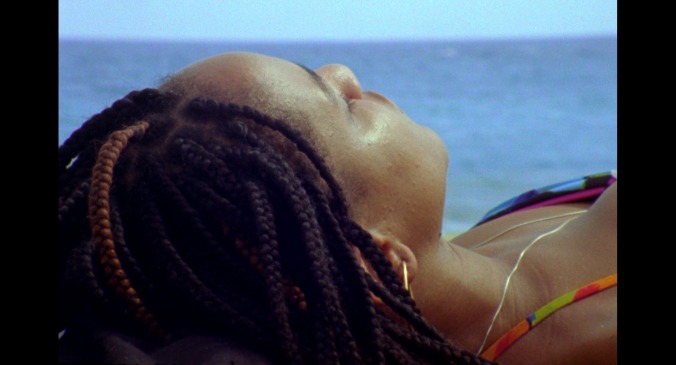In the powerful Beba, a woman searches for racial and ethnic identity
Director Rebeca Huntt’s documentary about generational trauma is an intoxicating, sometimes self-indulgent, mix of sound and fury
Film Reviews Beba
“I’m going to war and there will be casualties,” documentarian Rebeca Huntt says at the beginning of Beba, her raw and illuminating attempt to excavate her cultural identity from the rubble of her family’s troubled past. These causalities aren’t just the people she’s hurt or the societies and systems that have hurt her. The bi-racial New Yorker is also referring to viewers who will dismiss her film and, by extension, her journey, as the height of millennial-era narcissism or navel-gazing. That’s the risk she takes in this deeply confessional and, at times, bravely unflattering self-portrait about the generational trauma that created in her an “ancient pain that I struggle to understand.”
She articulates the problem using dreamy visuals, discordant music and poetic voiceover, and the result is an intoxicating and brutally honest self-appraisal. It can be overwhelming at times, and it’s true that Huntt’s deeply rooted powers of introspection can sometimes curdle into self-absorption. But her lacerating honesty and restless, searching spirit make Beba a virtuoso bomb-drop of a documentary.
The Afro-Latina Huntt—nicknamed Beba as a child—is not just the sum of race, class, gender and “the curses of my family.” She is also their victim, Huntt compellingly argues, and her search for the responsible parties begins in separate interviews with her parents. Huntt’s amiable father was born on a Dominican sugar cane plantation and he emigrated to New York with his mother in the mid-’60s. Upon starting a family, he moved his wife and three children to a one-bedroom New York City apartment that was “the best I was able to afford.” Huntt’s troubled sister remembers the neighborhood’s community garden where, as a child, she once picked up tiny, discarded glass containers, planted them in a flowerpot and took them to school for show and tell. Turns out the containers were empty vials of crack.
Huntt’s relationship with her Venezuelan mother, Veronica, is much more contentious. During their interview in a park, Huntt accuses her mother of the millennial crime of having a “micro-aggressive attitude.” Veronica reacts as if her daughter is speaking a different language which, in a sense, she is. Later, when Veronica is asked about her experiences in raising Black children, she forcefully responds that she considers herself Latin, not Black, American or white. It’s this lack of cultural footing that seems to be a major factor in Huntt’s identity issues.
Footage from her younger years provides more evidence of this, including her childhood summers in a pueblo in the Andes Mountains, her semester abroad in Ghana and her time at ultra-liberal Bard College. Her university experience, where she discovers Maya Angelou and splits her time between the “artistic Black kids” and the white kids, is a positive one, up to a point. She still lands on academic probation and when Huntt is told she shouldn’t wear belly shirts by her bi-racial professor, it becomes just another obstacle keeping her from embracing her true self.
Huntt has a ferocious and unfiltered artistic mind which can sometimes lead to her overstating her case. The film is broken up by unnecessary title cards and her poetry slam voiceovers can lead to awkward, Dylanesque lines like, “Michael, expelled from private school, a Bronx kid with origins in India and Puerto Rico, with bipolar disorder and X-ray vision.” Her thoughts, though trenchant, sometimes end with rhetorical mic drops when more exploration seems warranted. At age 17, “I lose my virginity to an asshole,” Huntt says with no further comment, and the root cause of her strained relationship with her brother is never revealed. In one post-Bard scene, her clueless, white, liberal friends argue that things are much better for Blacks nowadays causing an enraged Huntt to storm out of the room. But her incisive conclusion that “there is nothing honorable about trying to assimilate into a system that is designed to destroy you” loses its bite upon learning in the end credits that the conversation was staged.
Although her previous directing experience is comprised of only shorts, Huntt shows extreme confidence in her feature debut and key below the line contributors are completely in sync with her vision. DP Sophia Stieglitz creates 16mm visuals that are both swooning and streetwise, while composer Holland Andrews provides a hypnotic score. Wrangling the elements into a beautiful collage of sight, sound and emotion is editor Isabel Freeman. These emotions are not always pleasant but Huntt’s desire to paint as complete a picture of herself as possible is what gives Beba its discomfiting energy. Even passages that are difficult to hear, as when Huntt admits to choking her mother during a family squabble, become necessary pieces of a puzzle with no easy solution.
Beba is a work of searching, not finding, a visual essay where she lays out the familial curses that hobbled her and the racial assumptions that oppressed her. The emotional engine that drives her quest for understanding is not regret, longing or confusion, but anger and guilt. Anger that her lineage fated her to be “stubborn, narcissistic, chronically cruel.” Guilt that her ancestral faults are now so visible that “I fear my family will never talk to me again. I promise this is the last time I’ll snitch.” Expressing these ideas allows Huntt to reclaim at least some of her power as a Black woman in America. At its best, it’s an inspiring thing to behold. Despite its faults or, more likely, because of them, Beba is personal filmmaking at its most authentic.
1 Comment
Wow, I feel bad for her mother.